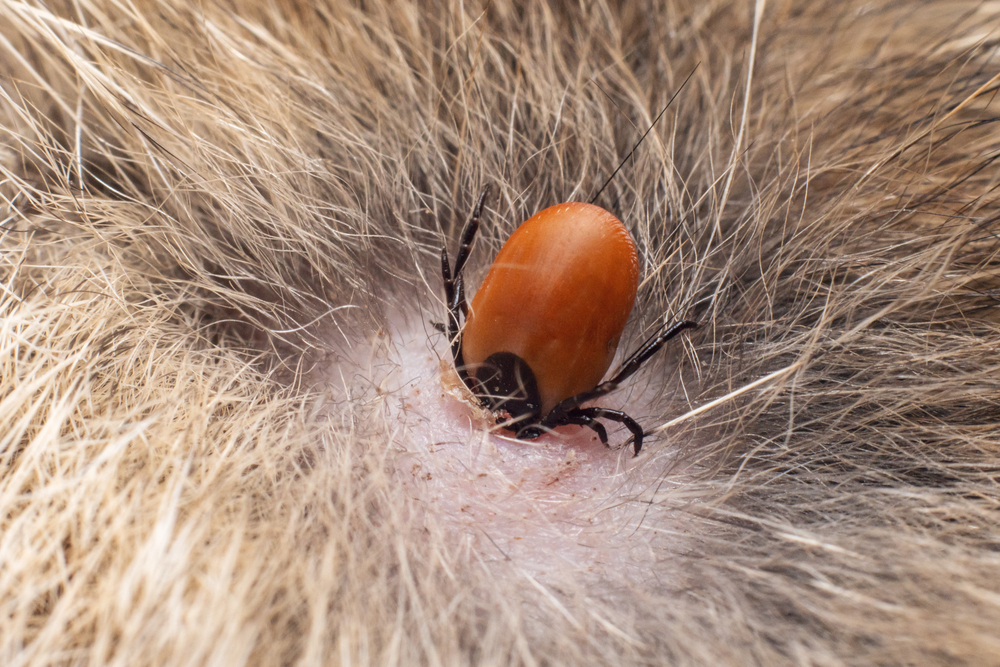Tiny Threats, Big Problems: How to Defend Your Pet Against Parasites
Few things gross out pet owners more than spotting parasites. Maybe you’ve seen tiny white worms wriggling in your puppy’s stool, found a tick latched onto your dog’s ear, or felt the itch of a flea bite inside your own home. Parasites are more than creepy crawlies- they can cause severe illness, spread disease to people, and compromise your pet’s quality of life.
At Cane Bay Veterinary Clinic in Summerville, we know these situations can be alarming. That’s why our team takes a Fear Free Certified approach, ensuring your pet’s visits are as calm and comfortable as possible while we provide the diagnostics, preventatives, and treatments needed to keep parasites under control.
From fleas and ticks to heartworm and intestinal worms, parasites affect nearly every part of a pet’s body. Because many infestations are invisible at first, prevention is always easier, safer, and more effective than treatment.
Why Year-Round Parasite Prevention Is Essential
Parasites don’t take holidays, and neither should prevention. The importance of year-round parasite prevention is clear: even indoor pets are at risk. Mosquitoes sneak inside, fleas hitchhike on clothing, and parasites can linger in soil for years.
Our preventative care services include customized parasite-prevention plans for puppies, kittens, and adult pets. Whether it’s monthly preventives, vaccines, or routine screenings, our veterinarians ensure your pet’s plan is tailored to their unique needs and lifestyle.
Intestinal Parasites in Dogs and Cats
Intestinal parasites like roundworms, hookworms, whipworms, and tapeworms are extremely common. Puppies and kittens are especially prone to roundworms because they can be passed from mother to offspring before birth or through nursing. Our puppy wellness and kitten wellness packages include fecal testing and deworming to catch problems early.
Symptoms may include diarrhea, vomiting, a bloated belly, anemia, or visible worms in the stool or vomit. Roundworms and hookworms are also zoonotic, which means people- especially children- can become infected. To reduce risk, avoid walking barefoot in areas where pets have defecated and discourage pets from licking faces and mouths.
Another intestinal parasite, giardia, is notoriously difficult to clear. Pets may reinfect themselves by licking their rear end, and the parasite can persist in water or the environment. Multiple rounds of treatment, frequent bathing, and careful sanitation are often necessary.
Routine fecal exams through our diagnostics service and consistent deworming are the best defenses.
Heartworm Disease in Pets
Heartworm disease is among the most dangerous of parasites. Spread by mosquito bites, larvae mature into worms that live in the heart, lungs, and blood vessels. Over time, they cause permanent organ damage, heart failure, and death.
Because symptoms may take months to appear, owners often miss early signs. The signs of heartworm disease include coughing, fatigue, and weight loss. Data from the Heartworm Prevalence Map show that cases occur in every U.S. state, including South Carolina.
Treatment is lengthy, expensive, and dangerous for dogs, and no safe treatment exists for cats. Prevention through monthly medications is the only reliable way to protect pets. If you miss a dose or notice worrisome symptoms, our urgent care team is available to help.
Fleas: Small Pests, Big Problems
Fleas reproduce quickly, making infestations frustrating to control. Their life cycle- eggs, larvae, pupae, adults- can take months to fully break, even after treatment. That’s why year-round protection is so important.
One challenge is resistance. Many fleas are now resistant to older over-the-counter products that have been on shelves for decades. Veterinary-prescribed preventives are far more effective at breaking infestations.
Fleas don’t just itch. They transmit tapeworms and bacteria, trigger flea allergy dermatitis in dogs and cats, and in heavy numbers can cause life-threatening flea anemia, especially in young or small pets.
If fleas are spotted, it may take three months or more of consistent prevention, household cleaning, and sometimes professional pest control to eliminate the problem completely. Our team will guide you through each step so treatment is less stressful for you and your pet.
Ticks and Tick-Borne Diseases in Pets
Ticks transmit serious diseases within hours of biting. They thrive in grassy, wooded, or even suburban yards.
- The most well-known illness is Lyme disease in dogs, which can cause lameness, fever, swollen joints, and kidney disease.
- Other risks include anaplasmosis, ehrlichiosis, and Rocky Mountain spotted fever.
The CDC’s guide to preventing ticks on pets emphasizes daily tick checks and consistent protection. Veterinarians recommend following proven tick prevention protocols to keep pets safe year-round.
Mites in Dogs and Cats
Mites in dogs and cats are microscopic parasites that cause mange, ear infections, and intense skin irritation.
- Demodex mites live in hair follicles and can cause patchy hair loss in puppies or immune-compromised pets.
- Sarcoptes mites (scabies) burrow into skin, causing intense itching and crusting, and can spread to people.
- Ear mites cause dark discharge, scratching, and ear infections, especially in cats.
Because mites are often diagnosed under the microscope, our diagnostics team uses cytology and skin scrapings to confirm infection and guide treatment.
Trematodes and Lung Fluke Infections
Though less common, trematodes (flukes) can cause significant illness. Pets become infected when they eat raw fish, crayfish, or snails that harbor larvae.
- Trematode infections are reported in certain U.S. regions.
- Lung fluke infection in dogs and cats may lead to coughing, breathing difficulty, or pneumonia.
Because these parasites are hard to detect, advanced testing like ultrasound or X-rays may be required.
Zoonotic Parasites: Protecting Families Too
Parasites can also pose risks to people. Zoonotic parasites like roundworms, hookworms, and giardia can infect humans. Children and immunocompromised individuals are especially vulnerable.
Protect your family by:
- Practicing good hand hygiene
- Avoiding barefoot walking in areas where pets defecate
- Discouraging pets from licking your mouth or face
- Keeping litter boxes and yards clean
How Veterinarians Diagnose Parasites
Because many infestations remain invisible until advanced, routine veterinary screenings are essential. Diagnostics may include:
- Fecal exams for intestinal parasites
- Bloodwork for heartworm or systemic illness
- Skin scrapings or ear swabs for mites
- Imaging like X-rays and ultrasound for organ-based parasites
At Cane Bay, our diagnostic services include in-house bloodwork, urinalysis, digital X-rays, cytology, and ultrasound, with board-certified radiologist support when needed.

Protecting Your Pet From Parasites Year-Round
Parasites may be common, but they are far from harmless. They cause chronic discomfort, transmit serious diseases, and put human family members at risk. The good news: prevention works.
At Cane Bay Veterinary Clinic, we tailor parasite-prevention plans for each pet’s age, lifestyle, and home environment. Whether you need help starting a puppy or kitten on the right path, want to update your adult pet’s preventatives, or need urgent parasite treatment, our team is here to help.
Have questions? Contact us today to get rid of the creepy crawlies on (and in) your pet.







Leave A Comment